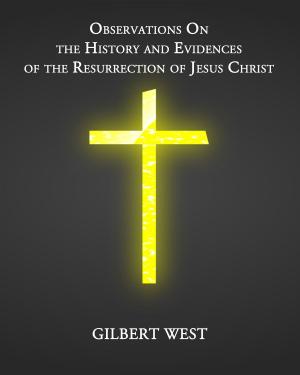The Perfect Will of God
Nonfiction, Religion & Spirituality, Christianity, Christian Literature, Christian Life| Author: | G. Campbell Morgan | ISBN: | 1230001935073 |
| Publisher: | CrossReach Publications | Publication: | September 26, 2017 |
| Imprint: | Language: | English |
| Author: | G. Campbell Morgan |
| ISBN: | 1230001935073 |
| Publisher: | CrossReach Publications |
| Publication: | September 26, 2017 |
| Imprint: | |
| Language: | English |
There is no phrase more often in use in Christian thought and speech than that of “The Will of God.” It constantly recurs in our reading of Scripture; our hymns are very many of them concerned with it; and in prayer we give utterance to it again and again.
This familiarity has in some measure robbed us of a keen sense of its vital importance. Its meaning is all too little realized. In common with many of the most sacred things, it has largely become a kind of fetish that is worshipped because it has a sound of piety; while the fact that it is the supreme subject of revelation, and the one and only abiding law of life, is forgotten. Notions that are false in themselves, and, therefore, pernicious in their effects, are held concerning it. These are not the result of thought, but rather of the lack of thought. There are many who imagine that the Will of God is something apart from human interests, to which men are to be resigned whenever they happen to be brought into contact with it. Frances Ridley Havergal said that “there is always a sigh of regret in resignation.” This is perfectly true; and that conception of the Will of God which looks upon it as a Divine interference to which we are to be resigned, is evil in its effects. How many there are who only think of their relation to the Will of God in times of sorrow and trial. They are perfectly sincere, therefore, when they sing—
“If Thou shouldst call me to resign
What most I prized—it ne’er was mine;
I only yield Thee what was Thine:
Thy will be done!”
Yet the very words of the hymn reveal the fact that the singer does not truly understand the safety, the blessedness, the delight of dwelling in the circle of the Divine Will.
The one and only law of life that sets a man free from all the forces that blight and destroy is the Will of God. Show me a man who lives for one day wholly, utterly, in word and thought and deed in the Will of God, and I will show you a man who is antedating heaven, and who for that day reaches the plane of life which is at once broadest, freest, and gladdest.
The word of God is given to man not that he may have a correct theory, but that he may have the truth. Truth is a sanctifying force, and a man holds the truth only when he is held by the truth. When truth possesses a man, all its glory and beauty are manifested through his life and character. The truth the Bible reveals is the Will of God for man. Sanctification by truth is the bringing of man into the Will of God. “The means of grace” are means to an end, that end being the realization of the Will of God. Every one of them tends to that issue. “The hope of glory” is the hope that ultimately the Will of God will be done upon the earth as in the heaven, or that the spirit of man, passing into the heavenly state, shall realize all the full blessedness of that Will.
There is no phrase more often in use in Christian thought and speech than that of “The Will of God.” It constantly recurs in our reading of Scripture; our hymns are very many of them concerned with it; and in prayer we give utterance to it again and again.
This familiarity has in some measure robbed us of a keen sense of its vital importance. Its meaning is all too little realized. In common with many of the most sacred things, it has largely become a kind of fetish that is worshipped because it has a sound of piety; while the fact that it is the supreme subject of revelation, and the one and only abiding law of life, is forgotten. Notions that are false in themselves, and, therefore, pernicious in their effects, are held concerning it. These are not the result of thought, but rather of the lack of thought. There are many who imagine that the Will of God is something apart from human interests, to which men are to be resigned whenever they happen to be brought into contact with it. Frances Ridley Havergal said that “there is always a sigh of regret in resignation.” This is perfectly true; and that conception of the Will of God which looks upon it as a Divine interference to which we are to be resigned, is evil in its effects. How many there are who only think of their relation to the Will of God in times of sorrow and trial. They are perfectly sincere, therefore, when they sing—
“If Thou shouldst call me to resign
What most I prized—it ne’er was mine;
I only yield Thee what was Thine:
Thy will be done!”
Yet the very words of the hymn reveal the fact that the singer does not truly understand the safety, the blessedness, the delight of dwelling in the circle of the Divine Will.
The one and only law of life that sets a man free from all the forces that blight and destroy is the Will of God. Show me a man who lives for one day wholly, utterly, in word and thought and deed in the Will of God, and I will show you a man who is antedating heaven, and who for that day reaches the plane of life which is at once broadest, freest, and gladdest.
The word of God is given to man not that he may have a correct theory, but that he may have the truth. Truth is a sanctifying force, and a man holds the truth only when he is held by the truth. When truth possesses a man, all its glory and beauty are manifested through his life and character. The truth the Bible reveals is the Will of God for man. Sanctification by truth is the bringing of man into the Will of God. “The means of grace” are means to an end, that end being the realization of the Will of God. Every one of them tends to that issue. “The hope of glory” is the hope that ultimately the Will of God will be done upon the earth as in the heaven, or that the spirit of man, passing into the heavenly state, shall realize all the full blessedness of that Will.















